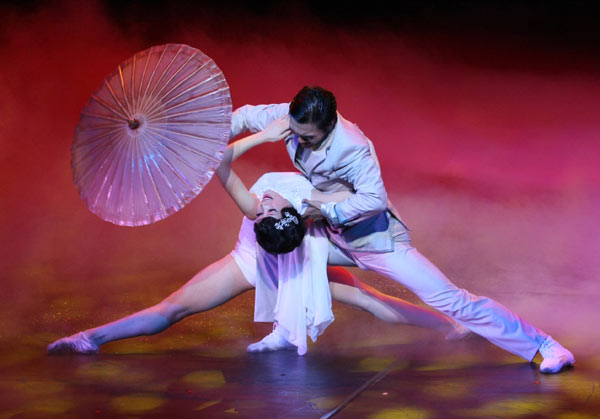Troupes ready for world stage
Updated: 2012-10-27 01:17
By Mu Qian (China Daily)
|
||||||||
More shows from China will appear on the global stage in the near future, thanks to the 14th China Shanghai International Arts Festival Performing Arts Fair, which just concluded in Shanghai.
Among them, Shanghai Puppet Theater will perform at next year's Budapest Spring Festival, Shanghai Song and Dance Ensemble's dance work Heaven, Earth and Man will tour the Beiteddine Art Festival of Lebanon in 2014, and Green Snake by the National Theater of China will premiere at the Hong Kong Arts Festival in March.
 |
|
A scene from the folk dance drama Zhou Xuan by the Shanghai Opera House. The drama is on stage at the 14th Shanghai International Arts Festival. [Provided to China Daily] |
These are some of the results of the fair, which was attended by more than 400 representatives from more than 250 organizations from 36 countries — the biggest in its history. At least 118 programs achieved an initial intent of cooperation.
"We hope the fair will become one of the most professional in the Asia-Pacific region, and provide a platform for Chinese performing arts to enter the international markets," says Wang Jun, president of the Center for China Shanghai International Arts Festival.
The fair showcased 27 original works of Chinese performing arts, including music, dance, theater and traditional Chinese operas. Among them, Tan Dun's new work The Secret Songs of Women — Symphony for 12 Micro Films, Harp and Orchestra got an initial invitation to perform at 15 international festivals.
However, many participants of the fair agree that there are still many obstacles for Chinese performing arts to enter international markets, and there's a long way to go for Chinese artists and arts administrators.
"Unlike performing arts coming from other Western cultures, one cannot assume that either the festival directors or audiences in the United States will have any knowledge or familiarity with Chinese performing arts genres, history, language, literature or themes," says Cathy Barbash, an American consultant in Chinese performing arts and cultural policy who is currently working on an agreement between Philadelphia Orchestra and the National Center for the Performing Arts of China.
"You are usually starting with zero recognition when attempting to book Chinese programs."
Chinese contemporary dance has been relatively well recognized by the world, with three or four companies at an international level with many overseas touring opportunities. But Barbash contends that the old-fashioned song and dance troupes of China and their dance dramas are problematic for sophisticated US audiences, who may find the story lines too sentimental and the dancing and acting too literal.
Another problem is the difference in tour planning. In the West, presenters or promoters tend to plan much more in advance than the art troupes do in China.
"Touring a soloist or a hundred-piece ensemble takes long-range planning for North America," says Earl G. Blackburn, senior vice-president of Opus 3 Artists, a New York agency that has toured artists from China since the early 1980s. "In the 2012 conferences with local presenters in the United States, which we just finished, we were discussing artists for the 2013-14, 2014-15, and even 2015-16 seasons."
But in China, art troupes usually don't plan for a tour more than a year ahead of time because many local governments' cultural departments don't approve their budgets for art troupes until very late.
"It is very hard for us to plan an overseas tour of a Chinese troupe because of the late decisions," says Wu Jiatong, general manager of Wu Promotion, one of the first private touring companies in China. "We often get requests to plan a tour in six months or sometimes even two months. Although there is the budget, it would be a very painful process."
Wu Promotion is famous for its overseas tours of Chinese orchestras of traditional instruments since 1998, and the acrobatic ballet Swan Lake, which was sold out in many countries, but Wu finds that Chinese troupes typically lack branding.
Many groups don't have an English name, or have several different ones that cause confusion. Many of them also don't have a website. Still fewer use social media to build up their fan base. There is still the problem of the craze for big productions, as many Chinese troupes compete in the scale of production and use of state-of-the-art technology. This has often increased costs so much that a tour becomes virtually impossible.
The good thing for Wu is that the Chinese government is now trying to boost the cultural industry and encourage private companies like his to engage in the international touring of performing arts.
But he has something to say about Chinese performing arts touring abroad. Echoing late Chinese leader Deng Xiaoping, "Chinese matters should be done in the Chinese way", Wu says, "international matters should be done in the international way, if Chinese performing arts want to tour abroad."
Contact the writer at muqian@chinadaily.com.cn

 Relief reaches isolated village
Relief reaches isolated village
 Rainfall poses new threats to quake-hit region
Rainfall poses new threats to quake-hit region
 Funerals begin for Boston bombing victims
Funerals begin for Boston bombing victims
 Quake takeaway from China's Air Force
Quake takeaway from China's Air Force
 Obama celebrates young inventors at science fair
Obama celebrates young inventors at science fair
 Earth Day marked around the world
Earth Day marked around the world
 Volunteer team helping students find sense of normalcy
Volunteer team helping students find sense of normalcy
 Ethnic groups quick to join rescue efforts
Ethnic groups quick to join rescue efforts
Most Viewed
Editor's Picks

|

|

|

|

|

|
Today's Top News
Health new priority for quake zone
Xi meets US top military officer
Japan's boats driven out of Diaoyu
China mulls online shopping legislation
Bird flu death toll rises to 22
Putin appoints new ambassador to China
Japanese ships blocked from Diaoyu Islands
Inspired by Guan, more Chinese pick up golf
US Weekly

|

|






